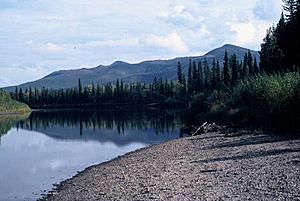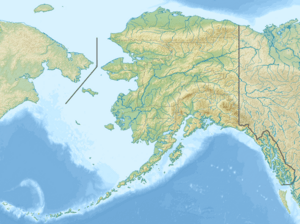Nowitna River facts for kids
Quick facts for kids Nowitna River |
|
|---|---|

Gravel bar in the Nowitna National Wildlife Refuge
|
|
|
Location of the mouth of the Nowitna River in Alaska
|
|
| Country | United States |
| State | Alaska |
| Census Area | Yukon–Koyukuk |
| Physical characteristics | |
| Main source | Kuskokwim Mountains 1,688 ft (515 m) 63°30′28″N 155°32′34″W / 63.50778°N 155.54278°W |
| River mouth | Yukon River 38 miles (61 km) northeast of Ruby 154 ft (47 m) 64°55′38″N 154°16′11″W / 64.92722°N 154.26972°W |
| Length | 250 mi (400 km) |
| Type: | Wild |
| Designated: | December 2, 1980 |
The Nowitna River is a long river in Alaska, one of the United States. It flows for about 250 miles (400 km) and is a smaller river that joins the much larger Yukon River. The Nowitna River starts in the Kuskokwim Mountains. It then travels northeast through a special protected area called the Nowitna National Wildlife Refuge.
The river eventually meets the Yukon River about 38 miles (61 km) northeast of a town called Ruby. Several smaller rivers flow into the Nowitna. These include the Titna, Big Mud, Little Mud, Lost, and Sulatna rivers.
In 1980, a large part of the Nowitna River was given a special title. About 225 miles (362 km) of the river within the wildlife refuge were named "wild." This means they became part of the National Wild and Scenic Rivers System. This special title helps protect the river. It means the Nowitna is mostly clean, flows freely, and is not easy to reach except by trails.
Boating Adventures on the Nowitna River
You can explore the Nowitna River using many different kinds of boats. People often use hard-shell, folding, or inflatable canoes. Kayaks and inflatable rafts are also popular choices for river trips.
River Difficulty and Challenges
Most of the Nowitna River is calm and easy to navigate. It moves slowly and winds its way through the landscape. This part of the river is rated as Class I, which means it's very easy for boating.
However, there is one section that is a bit more challenging. This part is called Nowitna Canyon. It's located between Mastodon Creek and the Big Mud River. In this canyon, you might find Class II rapids, which are a bit more difficult but still manageable for most boaters.
Things to Watch Out For
When boating on the Nowitna River, it's good to be aware of a few things.
- You might see black bears in the area. It's important to know how to stay safe around wildlife.
- The rapids in Nowitna Canyon need careful navigation.
- Sometimes, strong winds can blow upriver, especially closer to where the Nowitna joins the Yukon River. These winds can make paddling or steering your boat harder.
 | Sharif Bey |
 | Hale Woodruff |
 | Richmond Barthé |
 | Purvis Young |


